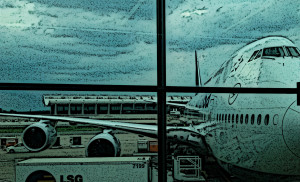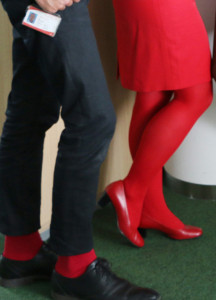Author Archives: Laura
Daesh and Devastation

From the Museum of Popular Traditions in downtown Amman. The caption reads, “A partridge in a cage is visited by another. In Byzantine sources, the caged bird is the symbol of the soul imprisoned in the human body.”
Given my opportunity to travel – my second time in the Middle East – I had some conversations that I feel responsible for sharing. Americans cannot pick up a newspaper and find out some of the sentiment in the Middle East – and multiple folks I’ve talked to here have brought up in conversation their hatred of ISIS. Having been here a week, I don’t want to tell you about the composition of Arab public opinion. You can read actual research on that. I mostly want to share first hand my conversations with a guy named Muhsin from Iraq, who worked at the hotel where I stayed.
ISIS’s victims are primarily Muslims who don’t conform sufficiently to their interpretation of Islam, and Muhsin told me his brother was one of them. Many (though I’d say, not most) men in Islam wear a beard because the Prophet Muhammad did, so that’s a cool thing you can have in common with someone who’s changed your life (my interpretation, not the official consensus). While there are many rules in Islam, there’s also free will, but ISIS enforces on others what they ought to be free to choose willingly…and then the maniacal part comes in, Muhsin said his brother was killed in cold blood for being a barber. He said he hated ISIS for that – but there’s more to the tragedy of what ISIS has taken from him. There was a wonderfully lyrical muezzin who gave the call to prayer at a mosque near the hotel. Hearing that one day, Muhsin said, “I love my God, but I no longer pray.” When I asked him why, he said that the association of Islam with ISIS had perverted his own religion to him. If you’re a person who draws key elements of your identity from your religion – like I am – you’ll know that being alienated from worship would be akin to getting your heart ripped out of your chest. Muhsin wanted to move to America, because he thought that there he could forget about all the misery he’s seen here and just live a life. While that sounded like a “streets paved with gold” fantasy to me, there is suffering here that goes beyond the American experience.
Reading over the State Department’s travel warnings, I was reminded violence doesn’t go away when I stop following the news about it. Hundreds of people are dying in Syria and Iraq every week, Lebanon is (again) in a state of upheaval, and Al-Qaeda has made Yemen a place where there are children who live off the trash of relief aid recipients (if you can call that living). If this is depressing you, know that there are peaceful, creative resistance efforts. The human spirit is probably weaker than demagogues, but it never fails to make a stand.
Jordan has neither a warning nor an alert; that’s a green light to travel there. The violence is unlikely to touch me here, but it’s harder to ignore its impact than at home.
Anticipation
 Traveling to Jordan to study Arabic has been two years in the planning stages for me. I finished my checklist before it was time to go, and then waiting stressed out both my partner and me.
Traveling to Jordan to study Arabic has been two years in the planning stages for me. I finished my checklist before it was time to go, and then waiting stressed out both my partner and me.
That anticipation lured my brain into the future. We’re not having this conversation for its own merits – it’s one of “the last ones” before I go. So that conversation has to be perfect, savored, and in a way it’s objectified. Too much anticipation disconnects you from reality, thinking about how you’ll look back on the present or planning out the memories you’ll make before you’re anywhere near them.

Flight crew (yes, dressed like this) repeated, “Austrian Airlines never serves pork,” during breakfast sandwich distribution. CC-BY-SA Austrian Airlines on flickr.
Circumstances conspired to keep me (figuratively) grounded though. For days prior to my flight I stayed up at night talking, plus my body refused to sleep during my 11 hours in the air. I increasingly lost the brainpower to think ahead. I hadn’t planned out what I would say to my partner at the airport, so I hadn’t steeled myself not to cry. In security, I needed a distraction from heartache and chose people-watching over more verbal activities. When the very professional Austrian Airline stewards brought me my breakfast sandwich, my brain contented itself with eating it. When we arrived a little late in Vienna, I was on autopilot to my next gate. On the next plane I read my guidebook, and just couldn’t wonder about how the visa process would go, or whether my school would really send a driver, or if my hostel reservation would be honored, or where I would get dinner. But when the time for each of those things happened, I followed the plan I had laid out for myself.
I made it and everything has been smooth, if a little abrupt after all that anticipation. Suddenly I’m here, and I’m speaking Arabic with the school driver – maybe I should be taking pictures out the window, or I should have studied more Jordanian colloquial particularities, yikes! But I’m not, and I didn’t. Whatever I’m saying now will have to be good enough, because I didn’t script it earlier and I can’t edit it later.
…Though I’ll probably rough sketch an itinerary when I wake up from my nap.
Praying the News 6/30/2015
Help save us from destroying ourselves in nuclear posturing, territory battles, political clashes that lose their ideological virtues faster than the death toll rises. Our human nature prizes winning so much that we unhesitatingly suck the hope out of our enemies, whether we use violence or not. This is what we do with our free will.
And yet, the work of people moving in another direction shows too; writing human rights reports, engaging in dialogues (even those that end in failure), deescalating situations with a warning shot instead of an assault, continuing to fight from jail or after intimidation, daring to start a new business, cleaning up after an explosion, launching a flotilla that can only hope to have symbolic impact while risking everything. These people’s efforts seem feeble to me, but how can they be? They crop up just as doggedly as evil.
Do sweet potatoes count as a life hack?
Duolingo is not where the heart of language-learning is
While working the Spanish side of duolingo, I found comments from a couple users who have somehow become sold on the misconception that translation is just a matter of word-for-word replacement:
If you limit your entire language learning endeavors to a single digital source, you might also come to believe a more insidious idea: that languages can be divorced from their native speakers. You might try to learn the mother tongue of a people-group without mingling with them – which is not only an ignorant and arrogant viewpoint, but it simply won’t lead to strong language skills. Translating between languages deserves to be approached with humility – it’s not some rote memorization to power through – because foreign words are not simply a code on top of meanings the student already knows from their own culture. Language learning is not a common hobby precisely because you have to leave your comfort zone to practice it. Learning from another culture suggests that the world you know is not enough – but in that is the very definition of broadening your horizons.
Clearly, language education needs innovation, so that classroom students take it seriously (displacing the attitude of “…don’t know much about the French I took”) as well as inviting graduates to continue studying and engaging foreign language materials. But the way those tools are designed sends a message, as does the way end-users engage the tools after they leave the drawing board. In my book, the prize goes to WordReference forums, a seeming “attachment” to a dictionary service. Magic happens when language learners and native speakers engage in active discussion of shades of meaning in a forum setting. My favorite thread started with a question about how to say “I love you” in Spanish – got 59 replies.
Your greed has not gone unnoticed

Photo by Miguel Pires da Rosa. CC BY-SA 2.0
My sister-in-law-to-be is 16 and has a vocabulary full of modern slang I don’t get. She says “thirsty”, as in, “Look at that kid whining for his toy; he’s thirsty,” which I understood to mean “he has a strong desire.” Now I think it means more than that.
I was telling her about an experience of asking to share a stranger’s umbrella, and in her concern for my physical safety, she said, “What if they were thirsty?” It wasn’t a question about a glass of water or a vampire’s snack. It made me think that her “thirsty” was one where a person is dangerous in their thirst, blind to others’ concerns, and willing to put their pursuit above anyone else’s. For a generation that came to consciousness in the shadow of the recession, how could there not be a word for this menace?



![91145[1]](http://fruitfultoo.com/wp/wp-content/uploads/911451-e1439999564760.jpg)


